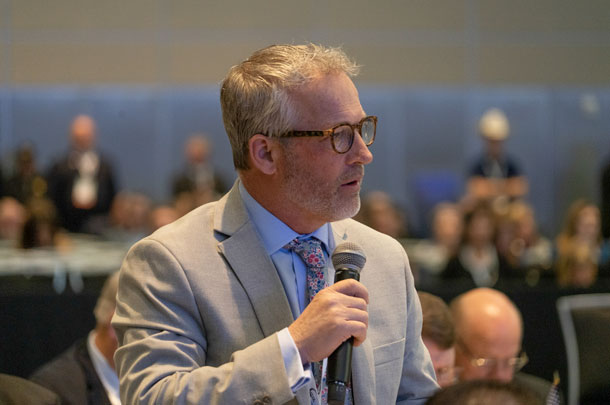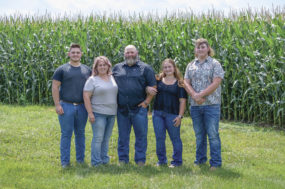Rollin was born in San Diego and was always working and learning from the time he could make it out the door. He is a third-generation dairy farmer who came to Riverdale, California in 1975 with his parents, who established their Sweet Haven Dairy with 350 cows.
“Today, Rollin Valley Farms milks over 2,000 cows, and brother Andy and I work under the family-held tenet of connectivity: Everything we do on the farm each day is part of a conscious cycle, from growing feed, to raising cows to producing milk. The herd is predominantly Holsteins with less than 10 percent Jerseys mixed in,” he says.
His father developed the original herd with inclusion of registered cows. Their dairy is part of California Dairies Inc., the largest dairy cooperative in California, which merged with the Fresno-based Danish Creamery, whose butter is still marketed under the Danish Creamery logo.
“The farm started with open lots but converted to freestalls around 1995,” Rollin says. “The individual stalls provide cows a clean, comfortable place for them to lie no matter what the weather is outside. However, caring for the cows is an amazing undertaking.
“I do not see many occupations, if any, that require so many different skill sets to ensure success,” he says. “It truly makes every day exciting, rewarding and challenging, all at the same time.”
Rollin says some of his everyday challenges include the overall health of the herd, making the dairy more efficient, labor and increased costs due to new fees and regulations. He says, these are challenges that need to be faced by the entire industry.
“We’re price takers, so it’s important to have healthy cows and to have those cows milking,” he says. “I believe the dairy has adapted well to the changes in the industry. I see areas where we’ve made a lot of progress [to become more efficient].”
An example Rollin cited is their commitment to conservation tillage through strip-till or no-till, which is a great way to reduce costs on fuel, labor, and wear and tear on equipment. Another adaptation is the merging of two milk barns into one a few years ago to reduce energy costs.
In addition to the herd, Rollin farms over 700 acres of row crops, including alfalfa, corn, wheat, oats and sudangrass. He also farms 15 acres of pomegranates and plans to plant more next winter.
“Rollin Valley Farms is conscious of how we store the feed corn to minimize volatile organic compounds and keep the piles small, which protects workers and produces better food for our cows,” he says.
Ryan Jacobsen, Fresno County Farm Bureau CEO, applauds Rollin’s contribution to agriculture in the county.

“Donny has been a vocal and thoughtful advocate for the California dairy community for over two decades, constantly showcasing the environmental stewardship, economic benefits and nutritious food products his family’s farm produces. He has been a valued member of the Fresno County Farm Bureau board of directors, currently serving as the organization’s district director on the California Farm Bureau board,” Jacobsen says.
Urban sprawl, Rollin says, is a problem for farmers, and it has grown more dire over the years.
“Finding a balance for water between urban and farm uses is a daunting task, especially when no infrastructure has been built since the early 1970s,” he says. “We may not live next door to a housing tract, but we share the same desire to have water when we turn on the tap. To add insult to injury, our urban counterparts increasingly have no idea of the true magic that happens on the farm every day. We manage amazingly fragile ecosystems on our farm as we care for livestock, water and soil. We invented sustainability.”
There is a plethora of other issues that will change the face of dairying in California in the near future. Water and immigration are the wild cards.
“We continue to push toward our deadlines where we must comply with SGMA [Sustainable Groundwater Management],” Rollin says. “Should ground water be cut back drastically, dairies could really feel the pinch with trees and vines running land prices up, where it doesn’t make sense to invest 30,000 to 40,000 dollars per acre to grow feed.
“Next, over the past 10 years, regulation costs have risen from 100 dollars per acre to a whopping 900 dollars per acre,” he says.
As dairy tries to comply with the never-ending barrage of environmental compliance items, can California’s dairy industry thrive, or maybe the question is, survive?
Rollin puts major emphasis on his employees’ roles in the success of the business. As with many family businesses, employees often become ingrained with the family operation.
“We strive to keep a good core of employees,” Rollin says. “We provide them with the tools and training necessary for them to be successful. One employee has been with us for over 33 years, while another group for almost 20 years.
“Finally, with most all of our employees on our farm with tenure from 10 years to 45 years of service, finding replacements for them as they age out is a true quandary,” he says. “We really need an immigration reform package to meet the labor challenges we face. The 22 families that have worked with us for decades are good people and deserve to have the ability to call this country home.” ![]()
PHOTO 1: California dairyman Donny Rollin says each day on his Fresno County, California farm is part of a cycle: growing feed to raising cows to producing milk. Photo courtesy of the American Farm Bureau Federation.
PHOTO 2: Donny Rollin, third-generation California dairyman, milks over 2,000 cows, mostly Holstein. He says that making the dairy more efficient and increased costs are some of the challenges facing the industry. Photo courtesy of the California Farm Bureau Federation.
Julia Hollister is a freelance writer based in San Francisco, California.





